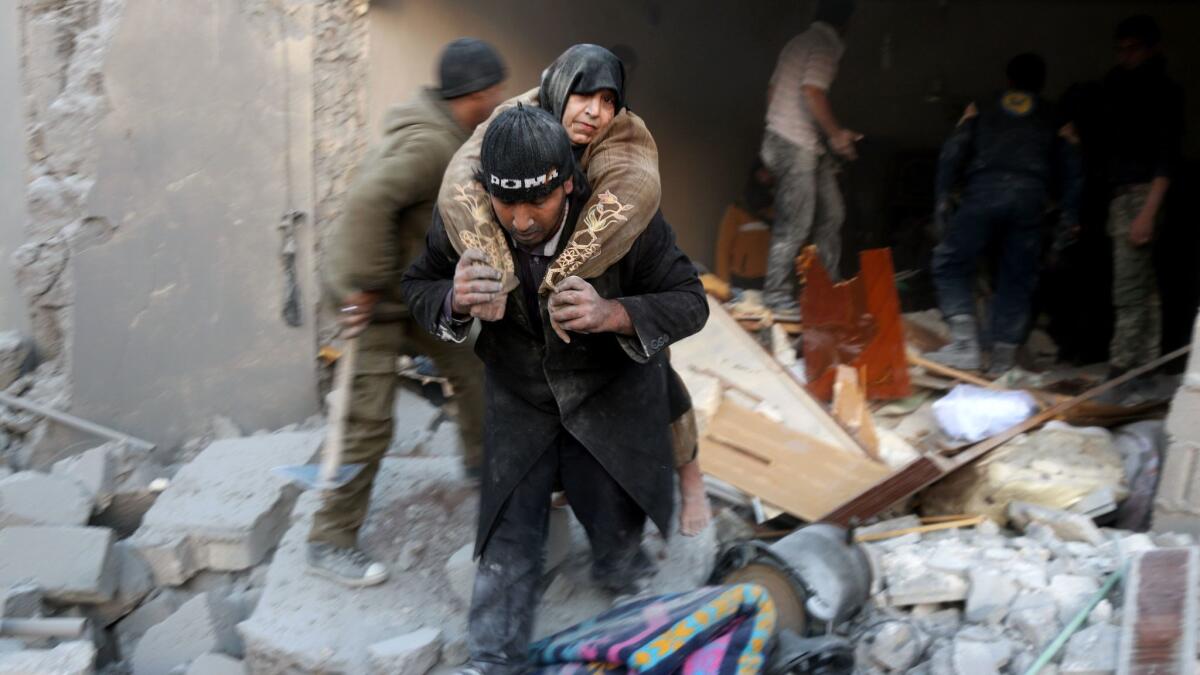Syrian government refuses United Nations truce terms for Aleppo

Reporting from Beirut — The Syrian government refused the U.N. envoy’s latest proposal for a truce in Aleppo on Sunday, calling on insurgents to withdraw and saying it would not grant autonomy to the rebel-held east in exchange for calm.
Foreign Minister Walid Moallem said restoring government rule was a matter of “national sovereignty” and that Damascus would not allow the people of eastern Aleppo to be “hostages to 6,000 gunmen.”
“We agreed on the need that terrorists should get out of east Aleppo to end the suffering of the civilians in the city,” he said.
Moallem spoke after meeting with U.N. envoy Staffan de Mistura, who acknowledged a “major disagreement” with Moallem and said a “creative” if interim solution was required to halt the violence.
“We are only proposing that there should not be a radical dramatic change in the administration of Aleppo until there is a political solution,” he said.
The envoy warned in a recent interview with the U.K. newspaper the Guardian that the government was chasing a “pyrrhic victory” in Aleppo if it does not reach a political settlement with the opposition.
De Mistura warned that the military’s approach would drive more moderate rebels into the ranks of Islamic State.
At least 172 civilians have been killed since the government renewed its assault on the besieged enclave six days ago, according to the Britain-based Syrian Observatory for Human Rights.
The U.N. estimates 275,000 people are trapped inside. By Saturday, the government had damaged or destroyed every hospital in the east, according to the Syrian American Medical Society, which supports hospitals in Syria.
The government denies striking hospitals, and De Mistura said there was a “difference of opinion” about the attacks. He said he had proposed sending an observer team to inspect all the hospitals in Aleppo, but that the idea was not discussed further.
De Mistura has proposed that the Syrian government grant eastern Aleppo autonomy in exchange for peace, and called on the estimated 900 Al Qaeda-linked militants in the east to depart to other rebel-held territory.
Moallem also called on the militants to withdraw, and said he hoped that U.S. President-elect Donald Trump’s incoming administration would cut off support for “terrorists” in Syria and “rein in” the states backing them, a reference to Turkey and Saudi Arabia.
President Bashar Assad said this week that Trump could prove to be a “natural ally” to Damascus.
On Sunday, pro-government forces advanced into parts of the strategically important Hanano district, according to state media and the Observatory.
“The regime is targeting everything that moves,” said Ammar Sakkar, an officer with the Fastaqim rebel faction in the city. He said the government had captured the Zuhour hill, which overlooks parts of the east.
Rebels outside the city have launched two unsuccessful offensives to break the government’s siege and have shelled the government-held western districts.
Earlier Sunday, at least eight children were killed when rockets struck a school in government-held western Aleppo, the Observatory said. Syrian state media said a teacher was also killed in the attack.
In the opposition-run village of Nusaybeen, outside Damascus, activists said at least one child was killed in a presumed government airstrike on a primary school.
The government has stepped up its attacks outside Damascus in the western Ghouta region after forcing rebels in eastern Ghouta to surrender earlier this year. The Observatory says at least 30 civilians have been killed in western Ghouta over the past 4 days.
In Aleppo, an airstrike early Sunday killed a family of six in their home in the Sakhour district in the east, according to the activist-run Thiqa News Agency. Witnesses said they smelled chlorine gas, and rescuers said the family appeared to have suffocated from toxic gas.
The allegations could not be independently verified. A U.N. investigative team has said the government has used chlorine as a chemical weapon on at least two occasions during the 5 1/2 -year conflict.
More to Read
Sign up for Essential California
The most important California stories and recommendations in your inbox every morning.
You may occasionally receive promotional content from the Los Angeles Times.










